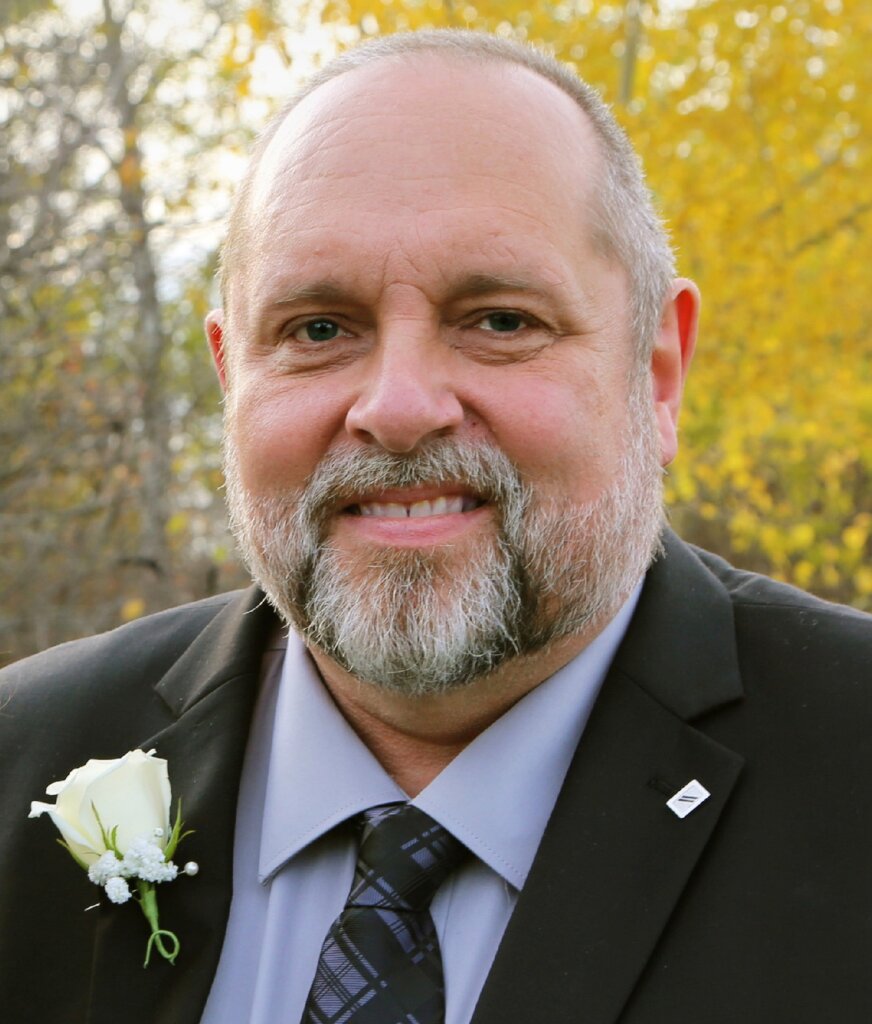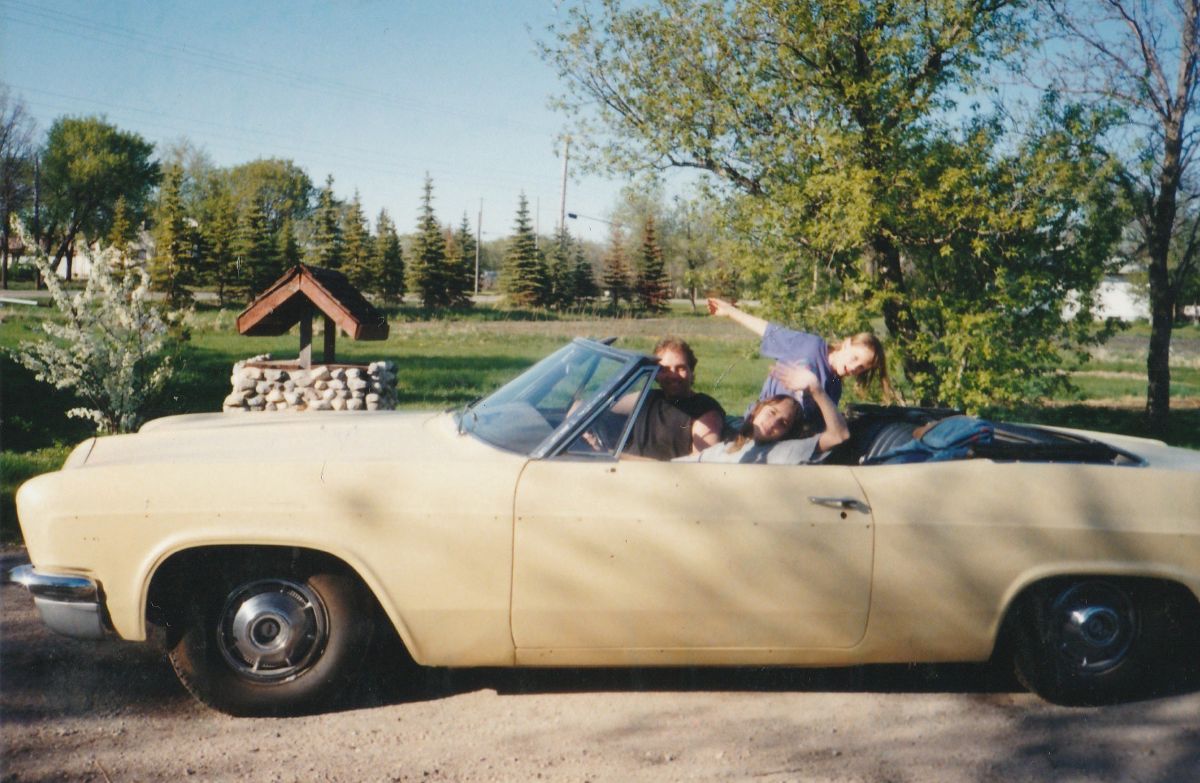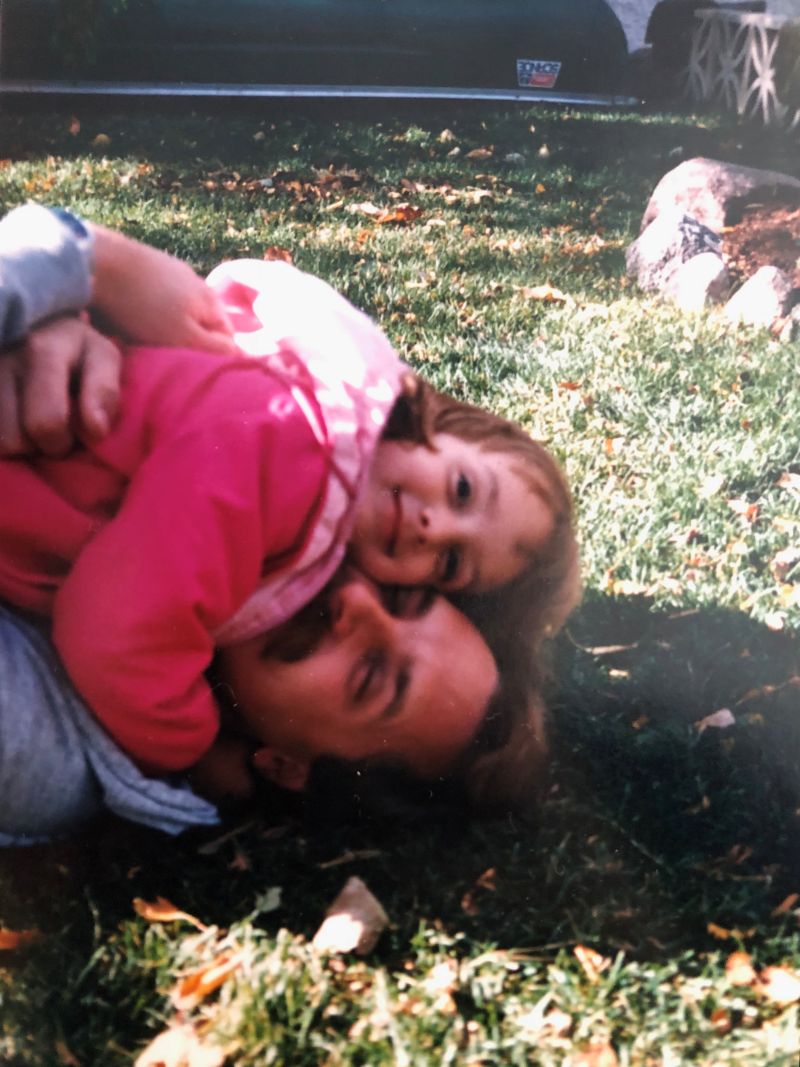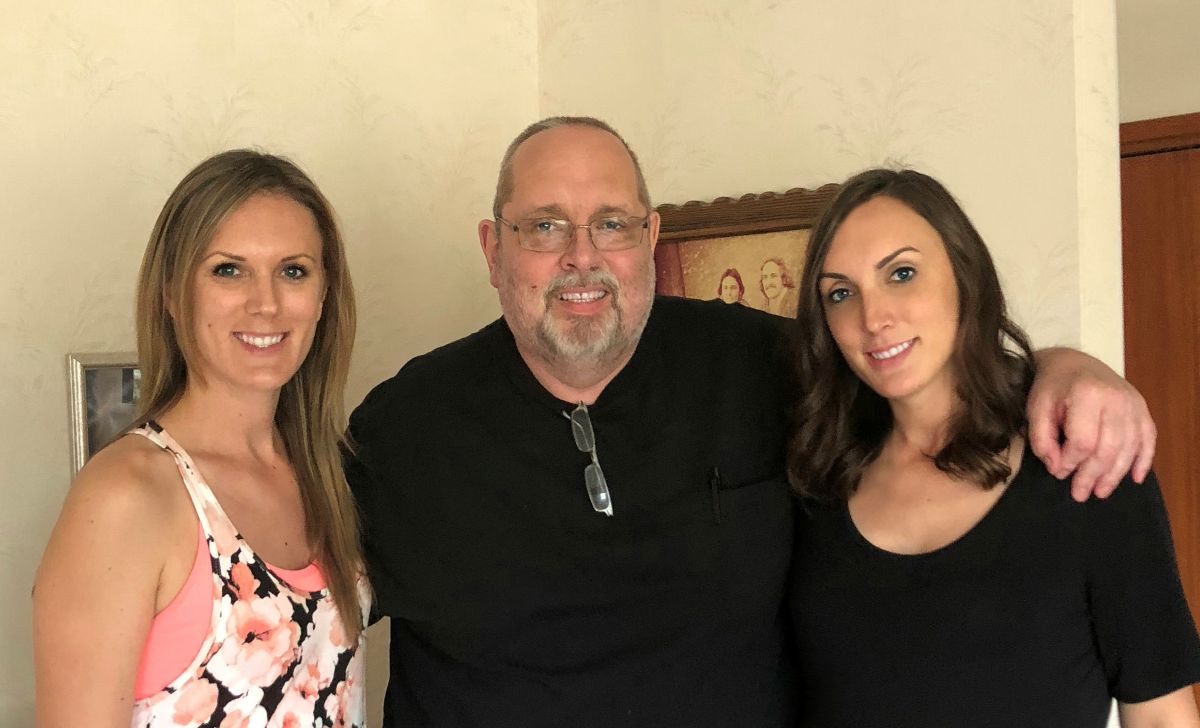
This one’s for you, Dad
This story was contributed by our content writer, Trina Boyko, who shares the stories of our community and works with our marketing and communications team.
When I think of my dad, I think of his smile first, and the chuckle that would usually follow it. Dad—whose name was Alvin Rehberg, or ‘Big Al’ to his friends—was a solid six-foot-three, with arms I always felt safe in. He loved his girls—me and my younger sister, Hayley—more than anything, and I never doubted that he would be there if we needed him.
As we grew up, he did all the “dad” things. He took us snowmobiling, one time leaving us with a couple he’d just met while he went to find help after his snowmobile broke down (my mom loved that). He taught us how to skate. He built a playhouse for us in our backyard. We spent hours upon hours with him in the garage, hammering together scraps of wood while he worked on his car. Antique cars were his passion, and we attended many car shows with him through the years.
Dad worked at Labatt from age 18, until Labatt’s Winnipeg brewery closed (ironically, Labatt’s head office is only a block away from Brain Tumour Foundation of Canada’s head office in London, Ont.). He then took on various jobs to support his family, from working as a tow truck driver to a purchasing agent at a retirement home.
My parents separated when I was 10 years old and my sister was five. My dad eventually settled in a home just outside the city, with a single bedroom in the attic. My sister and I had beds on one side of the room, and Dad’s bed was on the other side, but he took the couch on the weekends he had us.
A home filled with love—and music
 Though his home was small, it was filled with love. I remember my dad setting up a Christmas tree in the living room, which took up most of the space. I also remember him cooking dinner for us as music played in the background. He enjoyed all types of music, but at that point, his playlist included Gipsy Kings, Gloria Estefan, and Jonny Lang, a blues singer he once met in a mall. Dad was eclectic in every sense of the word.
Though his home was small, it was filled with love. I remember my dad setting up a Christmas tree in the living room, which took up most of the space. I also remember him cooking dinner for us as music played in the background. He enjoyed all types of music, but at that point, his playlist included Gipsy Kings, Gloria Estefan, and Jonny Lang, a blues singer he once met in a mall. Dad was eclectic in every sense of the word.
I can almost hear the music blasting as I picture my sister and I, painting handprints on the kitchen table while Dad looked on. He encouraged us to be creative, which for my sister, meant drawing, and for me, meant writing. He was creative himself—an incredible artist. He gave us free rein to be ourselves, whatever that looked like.
Hayley echoed his interests. She was always out in the yard with him, getting her hands dirty and learning how to fix cars. Me? I was the “princess” of the family who drove his riding lawnmower into the basement window. But, Dad never judged and he treated us equally. He treated everyone equally, no matter their apparent status.
Noticing changes
We don’t know exactly when he got sick. My grandfather—my dad’s dad—passed away in October 2017, which was hard on our close-knit family. That’s about the time I started noticing personality changes in my dad. He was often angry and unreasonable.
Then, he started falling—first into the living room table, and then down the stairs.
After his fall down the stairs, he was brought to the hospital. I was eight months pregnant at the time, on my way to drop my one-year-old off at daycare, when I got the call that not only was my dad in the hospital, but he’d been diagnosed with glioblastoma.
I didn’t know what glioblastoma was. I didn’t know much about brain tumours either, other than knowing my aunt had passed away from one years earlier. I didn’t know there were different types of tumours, and I certainly didn’t know that glioblastoma was not the kind you wanted to get.
I dropped my son off at daycare, told my workplace I wasn’t coming in, and then cried the whole way to the hospital. My dad was irate and aggressive with hospital staff, begging to go home. He was just not himself, at all.
I apologized profusely to the staff working with him and picked up some car magazines for my dad in the hospital’s gift shop. I don’t think he read any of them, but I wanted to keep him busy as I knew he would be there for a while.
He was eventually discharged, with my grandmother taking on his day-to-day care. “Wait for an appointment with a neurologist,” we were told.
That we did, and my sister and I both stood behind our dad as his results were shown.
“I’m sorry to tell you this, but this tumour will take your life,” said the neurologist. While our dad was not the healthiest person, the neurologist attributed his tumour to “100 per cent bad luck.”
My dad nodded, taking in the news as a tear fell down his cheek. My sister and I went into action mode, maybe not fully comprehending what we’d heard. Our dad was not going to die. He was still very much with us, and we were going to manage his appointments and take care of him the best we could.
Dad was not a great candidate for surgery, given his not-so-great health, so radiation was recommended. Getting him to go to his radiation appointments was another story. He missed several appointments, refusing to even get in the car.
One day, my grandmother called to tell me that my dad was on the kitchen floor and he couldn’t get up. I could hear my dad groaning in pain, which broke my heart. I called emergency services immediately and they brought him back to the hospital.
“This is a really nice hotel,” Dad told me, looking at the melon-coloured walls, “but I think I’d rather go home.”
Making a difficult decision
 At this point, caring for my dad was too much for my grandmother to bear. She was in her early 80s and in no shape to take on his challenges, especially since he hadn’t been allowing visits from home care. We made the difficult decision to move my dad to palliative care, though he never made it there.
At this point, caring for my dad was too much for my grandmother to bear. She was in her early 80s and in no shape to take on his challenges, especially since he hadn’t been allowing visits from home care. We made the difficult decision to move my dad to palliative care, though he never made it there.
It was during a visit with him, two days before he passed away, that he complained to me about the food in his “hotel.” All he wanted was a cheeseburger.
I asked his nurse if I could bring him one, and she shrugged. She knew, at that point, it was about keeping him happy and comfortable, so she gave me the okay.
I ordered a cheeseburger for him and a veggie burger for me from the hospital’s restaurant, and sat beside him as we shared a meal for the last time. I talked to him about my childhood memories and thanked him for all he’d taught me. Nearly every other visit, I’d brought my family along, but this time, I wanted to go alone. I didn’t know I’d have only two days left with him, though it was important for me to tell him what I felt I needed to tell him, by myself.
I hugged him and said goodbye, telling him I’d be back to visit him tomorrow. I was just leaving when the nurses arrived to take him for an X-ray, as he’d fallen again recently. I couldn’t help but hear him yelling in pain as they moved him out of bed, and I stood in the hallway, crying.
As they wheeled him out of his room, I told him I wasn’t going anywhere. I held his hand as we headed towards the X-ray department, and he bragged to the nurses about his daughter.
“I have another daughter too, you know,” he said.
That was Dad, always needing to make things equal.
The next day, I don’t even know if Dad knew I was there. He was rambling incoherently and I asked his nurse when this new behaviour started. She told me that it happened overnight, but she was hopeful he’d improve with a change in medication.
Again, I hugged him and said goodbye, without knowing it was the last time I’d hear his voice.
Saying goodbye
I woke at 2 a.m. to my mom calling me. I’d missed several calls from the hospital and from my sister.
“I’m on my way to your house to stay with the kids,” my mom said. “You need to get to the hospital—now.”
My sister was already at the hospital, so I called her and asked her to put me on speakerphone.
“Dad,” I said, “You need to wait for me. Please wait for me. I’m on my way.”
He waited. My sister and I held his hands as he took his last breath, shortly after I’d arrived. We lost our dad on July 26, 2018, one day short of two months from his diagnosis, when he was 60 years old.
As I left the hospital early that morning, I distinctly remember the sun shining through the windows and the person who wished me a good day. I’d just been through the worst moments of my life, but I realized then that life goes on—even if it’s different than the way we imagined it.
Keeping Dad’s memory alive
 Later that summer, I heard that Jonny Lang was playing a concert in Winnipeg. I attended with my husband and sister, singing along to all of Dad’s favourite songs. Music has been a way for me to honour and remember him, to this day.
Later that summer, I heard that Jonny Lang was playing a concert in Winnipeg. I attended with my husband and sister, singing along to all of Dad’s favourite songs. Music has been a way for me to honour and remember him, to this day.
I know at Brain Tumour Foundation of Canada, we strive to provide hope, and I wish my dad’s story could do that. But real life isn’t always rainbows, and it’s why I joined the team at Brain Tumour Foundation of Canada. I believe in a future without brain tumours. I believe that one day, a family won’t have to say goodbye to their loved one, because of the difference we’re making today.
My dad’s experience was such a whirlwind that I didn’t become involved with Brain Tumour Foundation of Canada until after he’d passed away. I began participating in Brain Tumour Walks, and took a term position with our local cancer centre before I came across the posting for my current job. It was the perfect fit, and I can’t help but feel my dad had a hand in that.
My paternal grandmother is now almost 90 and I’ve since taken over care for her. It goes to show the ripple effect that brain tumours have and how deeply they affect those diagnosed, as well as their families.
I tell my kids all the time about their grandpa and how much he loved them. I promised him that his memory would live on, and it does. It lives on in my boys—my six-foot-six, 18-year-old, Taven, who has his grandpa’s stature and honest heart; my eight-year-old, Hudson, who looks just like his grandpa did at his age and who shares his kind, loving nature and artistic talents; and my six-year-old, Hayden, who is humorous and stubborn, like his grandpa was, and who was only a month old when his grandpa passed away.
He would also be thrilled to know he has a new grandson, my sister’s one-year-old, Calvin, whose name was chosen for its similarity to his late grandpa’s name.
My dad lives on in my sister and I, too, and the work I’m proud to do. I am honoured to be able to share the stories of the brain tumour community, and I look forward to a day when all our stories have a happier ending.
